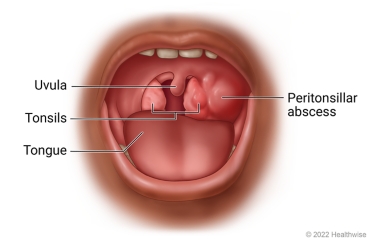
Your Care Instructions
A peritonsillar abscess is a collection of pus that forms in tissues around one or both of the tonsils. It can occur as a result of strep throat or another infection. An abscess can cause severe pain and make it very hard to swallow.
Your child will need antibiotics. In some cases, the abscess will have been drained through a needle or small incision.
Your child may have had a sedative to help them relax. Your child may be unsteady after having sedation. It takes time (sometimes a few hours) for the medicine's effects to wear off. Common side effects of sedation include nausea, vomiting, and feeling sleepy or cranky.
Follow-up care is a key part of your child's treatment and safety. Be sure to make and go to all appointments, and call your doctor if your child is having problems. It's also a good idea to know your child's test results and keep a list of the medicines your child takes.
How can you care for your child at home?
- If the doctor prescribed antibiotics for your child, give them as directed. Do not stop using them just because your child feels better. Your child needs to take the full course of antibiotics.
- Be safe with medicines. Give pain medicines exactly as directed.
- If the doctor gave your child a prescription medicine for pain, give it as prescribed.
- If your child is not taking a prescription pain medicine, ask your doctor if your child can take an over-the-counter medicine.
- Do not give aspirin to anyone younger than 20. It has been linked to Reye syndrome, a serious illness.
- Make sure your child gets lots of rest.
- Follow your doctor's instructions if the abscess was drained through a needle or small incision.
- While your child's throat is very sore, use liquid nourishment such as soup or high-protein drinks.
When should you call for help?
Call 911 anytime you think your child may need emergency care. For example, call if:
- Your child has trouble breathing. Symptoms may include:
- Using the belly muscles to breathe.
- The chest sinking in or the nostrils flaring when your child struggles to breathe.
- Your child is very sleepy and you have trouble waking him or her.
- Your child passes out (loses consciousness).
- Your child has a lot of blood coming from the mouth.
Call your doctor now or seek immediate medical care if:
- Your child has new or worse symptoms of infection, such as:
- Increased pain, swelling, warmth, or redness.
- Red streaks coming from the area.
- Pus draining from the area.
- A fever.
- Your child is bleeding.
- Your child has new or worse nausea or vomiting.
- Your child has new or worse trouble swallowing.
- Your child has a hard time drinking fluids.
Watch closely for changes in your child's health, and be sure to contact your doctor if:
- Your child does not get better as expected.
Current as of: October 27, 2024
Author: Ignite Healthwise, LLC Staff
Clinical Review Board
All Healthwise education is reviewed by a team that includes physicians, nurses, advanced practitioners, registered dieticians, and other healthcare professionals.

